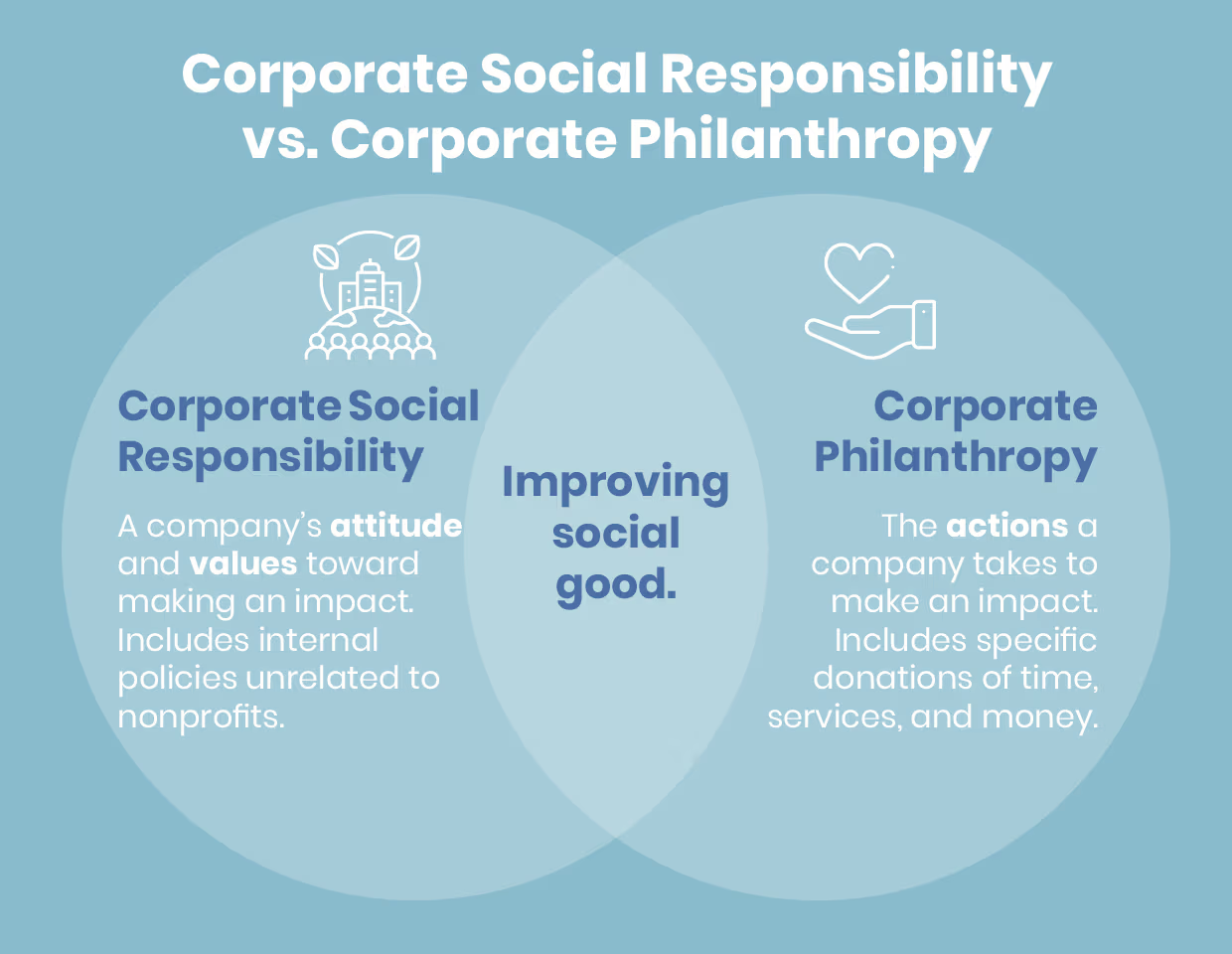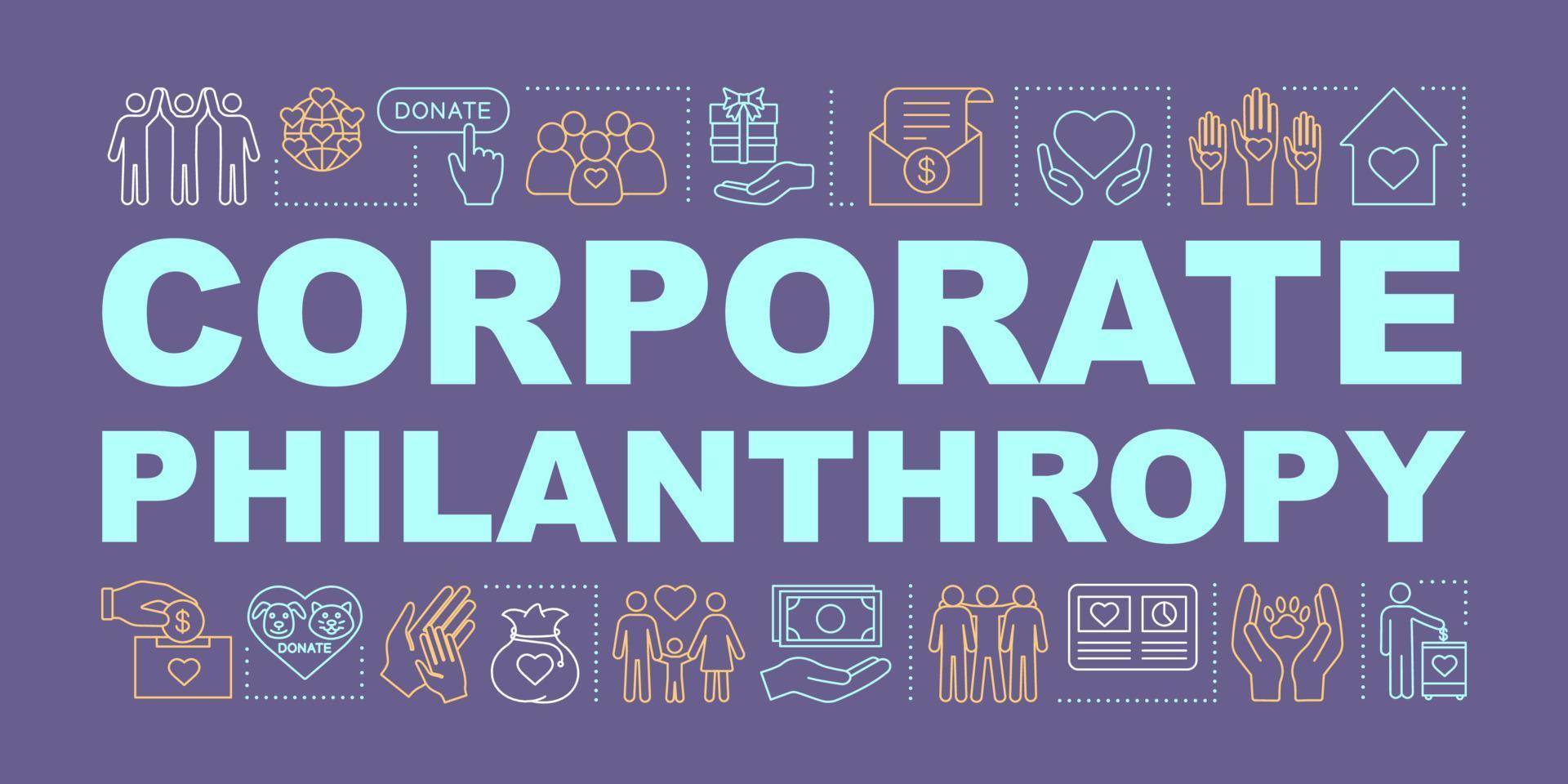The power of partnership: How nonprofits benefit from corporate philanthropy
Exploring Exactly How Company Philanthropy Shapes Brand Online Reputation and Customer Commitment
Corporate philanthropy greatly influences brand track record and client commitment. Business that engage in authentic charitable efforts usually see a positive shift in exactly how consumers view them. This placement of values promotes count on and psychological links with target markets. Nevertheless, the efficiency of these humanitarian initiatives can vary significantly. Recognizing what genuinely resonates with customers is necessary for brand names seeking to enhance their social effect and market setting. What methods will arise as important for future success?
The Evolution of Business Philanthropy
As businesses progressively acknowledge their role in society, the evolution of business philanthropy has changed from plain philanthropic donations to a tactical element of brand name identity. Originally, firms engaged in philanthropy mainly for tax advantages or to enhance their public picture. Gradually, this method moved as stakeholders-- consisting of staff members, customers, and financiers-- required a much more genuine dedication to social duty.
Organizations began aligning their philanthropic initiatives with their core values and business objectives, resulting in more impactful and thoughtful payments. This modification has actually motivated business to buy sustainable methods and neighborhood advancement, promoting a sense of purpose that resonates with customers.
In addition, technological advancements have helped with transparency and engagement, allowing organizations to display their philanthropic efforts better. As a result, corporate philanthropy has emerged as an integral component of company strategy, with companies accepting the possibility to favorably influence society while boosting their overall brand name narrative.
The Effect of Philanthropy on Brand Name Understanding
While firms participate in kind efforts to promote social good, these efforts considerably shape brand understanding amongst consumers. Corporate philanthropy can improve a brand's picture by linking it with positive social influence and community involvement. Consumers frequently regard brands that actively join charitable activities as more trustworthy and liable. This perception can affect purchasing decisions, as customers might choose brand names that demonstrate a dedication to social concerns.

Building Emotional Connections Through Offering
Company philanthropy offers as an effective device for boosting brand identification by linking business values with community needs. Through calculated offering, firms can cultivate community interaction and create shared values that resonate with consumers on an emotional level. This approach not only strengthens brand name reputation but also builds long lasting connections between businesses and their stakeholders.
Enhancing Brand Name Identification
They not just contribute to societal good yet additionally build much deeper emotional connections with their audiences when firms involve in humanitarian efforts. By straightening their brand with charitable reasons, companies enhance their identification and signal worths that resonate with consumers. This placement produces a narrative that exceeds product or services, inviting customers to join a common mission. As customers increasingly focus on purpose-driven brands, firms that proactively take part in offering can distinguish themselves in a crowded market. Such campaigns cultivate a feeling of commitment amongst clients that feel directly linked to the brand name's values. Ultimately, business philanthropy becomes a vital device for improving brand identification, cultivating long-term relationships based upon shared ideas and emotional interaction.
Fostering Community Interaction
Numerous research studies indicate that business involving in community-focused humanitarian initiatives can substantially strengthen emotional links with their stakeholders. By buying regional tasks and supporting social reasons, businesses cultivate a feeling of belonging and trust within the area. This interaction cultivates a positive brand picture, as customers appreciate business that demonstrate genuine concern for societal concerns. Workers usually really feel much more inspired and honored to be associated with an organization that prioritizes neighborhood welfare. As an outcome, customers are extra most likely to develop loyalty towards brands that actively add to meaningful reasons. Ultimately, fostering community engagement through philanthropy not only enhances brand credibility however also develops long lasting emotional ties that benefit both the area and the firm it offers.
Developing Shared Worths
Exactly how can services efficiently produce shared worths that reverberate with their stakeholders? Business can accomplish this by aligning their philanthropic initiatives with their core goal and the passions of their neighborhoods. By taking part in initiatives that address neighborhood needs, companies foster emotional links with customers, enhancing brand name commitment. As an example, partnering with non-profits that mirror shared worths strengthens the brand name's photo and demonstrates dedication to social duty. Additionally, clear communication concerning these efforts allows stakeholders to see the substantial influence of their contributions. Inevitably, by integrating common values right into their corporate philanthropy, firms not only improve their credibilities but likewise cultivate long-term connections with customers, leading to enhanced loyalty and depend on. This alignment is necessary in contemporary customer decision-making.
Case Researches: Effective Philanthropic Campaigns
Checking out effective humanitarian projects reveals different strategies that improve brand name credibility. Impactful neighborhood initiatives, ingenious collaboration versions, and long-term engagement approaches have shown effective in cultivating positive links with customers. These study highlight the value of thoughtful corporate giving in achieving both social and company purposes.
Impactful Community Initiatives
Numerous business have efficiently leveraged kind campaigns to enhance their brand credibility while making a purposeful influence in their communities. An innovation company introduced an electronic proficiency program in underserved communities, offering training and sources that equipped regional citizens. This effort not only added to neighborhood advancement however also positioned the company as a socially responsible leader. Similarly, a major food firm carried out a cravings alleviation campaign, partnering with neighborhood nonprofits to disperse dishes to family members in demand. This effort strengthened area connections and promoted customer commitment. Via these impactful efforts, business have shown their commitment to social responsibility, effectively straightening their brand values with the demands of the neighborhoods they serve, ultimately boosting their general reputation.
Cutting-edge Collaboration Models
The success of impactful area efforts frequently rests on cutting-edge partnership versions that combine diverse stakeholders to resolve complicated social obstacles. Situation studies highlight exactly how firms, non-profits, and government entities can collaborate successfully. As an example, an international corporation partnered with a neighborhood non-profit to release an education and learning program, pooling sources and experience to improve area literacy prices. One more instance entailed a tech business and a medical care organization signing up with pressures to develop a telemedicine option for underserved populaces. These partnerships not only intensified the reach of philanthropic efforts however additionally enhanced the brands' track records by straightening their missions with neighborhood requirements. Inevitably, innovative partnership designs work as a driver for purposeful modification and foster more powerful connections between brand names and their customers.
Long-term Involvement Strategies

Measuring the ROI of Business Social Responsibility
As companies significantly buy business social obligation (CSR) initiatives, recognizing the return on financial investment (ROI) related to these efforts becomes vital. Measuring ROI in CSR is complex, commonly including both quantitative and qualitative metrics. Monetary returns can be assessed via boosted sales, improved brand commitment, and improved staff member morale, which can lead to greater productivity. In addition, business might examine cost financial savings linked to lasting practices, such as lowered waste or energy intake.
Qualitatively, the effect of CSR on brand name credibility can be reviewed with customer assumption studies and social media belief evaluation. Studies can supply insights right into exactly how CSR tasks influence customer commitment and trust. Benchmarking against sector standards can aid organizations assess their CSR performance - corporate philanthropy. Ultimately, a thorough approach to determining ROI makes it possible for companies to make educated choices concerning future CSR investments, lining up methods with both economic performance and social impact
Consumer Expectations and Business Duty
Significantly, customers expect here business to run with a solid feeling of business duty, viewing ethical methods as a prerequisite for brand loyalty. This shift in assumption shows an expanding recognition of social and ecological concerns, leading customers to favor brands that align with their worths. Customers are more inclined to sustain firms that take part in clear techniques, show sustainability, and add favorably to their neighborhoods.
Furthermore, social networks enhances these expectations, permitting customers to share their viewpoints and experiences quickly. Brands that fall short to satisfy these ethical criteria run the risk of backlash, while those that welcome business responsibility often appreciate improved credibility and consumer loyalty. As customers demand accountability, business must incorporate business social duty into their core strategies, focusing on ethical habits not equally as an advertising and marketing technique, yet as a fundamental element of their operations. This placement can eventually bring about stronger brand name affinity and continual success in affordable markets.
Future Patterns in Company Philanthropy and Brand Commitment
The landscape of business philanthropy is evolving, influenced by the intense consumer assumptions surrounding company responsibility. Business are significantly incorporating social impact right into their core business techniques, not just as an ancillary activity. Future patterns show a shift toward openness, with brand names sharing detailed info concerning their philanthropic efforts and their straight results on areas.
Modern technology is playing a crucial function, allowing real-time involvement in between customers and brand names. Social media platforms assist in straight communication, enabling consumers to articulate their expectations and hold brand names responsible. In addition, more youthful generations, particularly Millennials and Gen Z, prioritize sustainability and honest methods, driving services to embrace more conscientious techniques.
As business philanthropy ends up being associated with brand identity, business that authentically straighten their objectives with societal needs are likely to foster more powerful consumer commitment. This convergence of values will ultimately form the future of corporate online reputation and customer connections in a progressively conscientious marketplace.
Regularly Asked Inquiries
Exactly How Do Consumers Find Out Concerning a Firm's Philanthropic Efforts?
Customers discover a firm's kind efforts through numerous networks, including social media sites, press launches, neighborhood events, and word-of-mouth. These methods assist in understanding, making it possible for individuals to involve with brands that align with their worths and interests.
What Role Does Staff Member Involvement Play in Company Philanthropy?
Worker participation in business philanthropy enhances involvement, fosters a feeling of ownership, and reinforces team communication - corporate philanthropy. This involvement often intensifies the impact of philanthropic efforts, leading to higher awareness and assistance for the company's humanitarian initiatives
Can Corporate Philanthropy Backfire on a Brand's Online reputation?
If perceived as insincere or opportunistic, business philanthropy can without a doubt backfire on a brand's online reputation. Negative public understanding might arise, causing lessened trust and loyalty amongst customers that focus on credibility in corporate activities.
Are Smaller Sized Firms as Effective in Philanthropy as Larger Companies?
Smaller sized firms can be equally effective in philanthropy as bigger corporations, often demonstrating agility and authenticity. Their local initiatives might reverberate more deeply with communities, promoting authentic links in spite of minimal sources contrasted to their bigger counterparts.
How Can Companies Select the Right Triggers to Support?
Business can select the ideal bring on by straightening their values with neighborhood requirements, examining stakeholder passions, and reviewing possible influence. This critical approach fosters credibility, enhances engagement, and strengthens connections with customers and the broader community.
While firms involve in kind initiatives to promote social great, these initiatives significantly shape brand name assumption amongst customers. As consumers increasingly prioritize purpose-driven brand names, firms that actively engage in giving can separate themselves in a jampacked market. Lots of business have effectively leveraged kind projects to boost their brand reputation while making a meaningful influence in their areas. find more information Progressively, consumers anticipate business to operate with a solid sense of corporate duty, checking out honest practices as a requirement for brand commitment. As business philanthropy becomes identified with brand identity, firms that authentically align their goals with social needs are most likely to foster more powerful client commitment.